- Bernard Preston homepage
- Fiber
What is a dietary fiber?
What is a dietary fiber is an important question for us all to grasp; on typical grocery store meals most people are getting less than half of what is absolutely necessary for wellness. It's recommended we eat at least 30 grams per day; beware of the synthetics that food companies are adding.
Those who grow much of their own food have little to fear; nor epicures who get their fruit and vegetables from the greengrocer or farmers' markets. But most folk are enjoying the convenience of the so-called "industrial diet" with serious consequences; misery lies ahead.
Here lie the chronic degenerative diseases in wait; over 30% of the population have one or more, in large measure because the dietary fiber and other nutrients have been extracted from our food.
That means cardiovascular disease, diabetes and cancer; and degenerative joints.
Whole grains, green legumes and fresh organic vegetables are increasingly difficult to get. Our taste buds have been coached to expect highly-refined and processed foods.
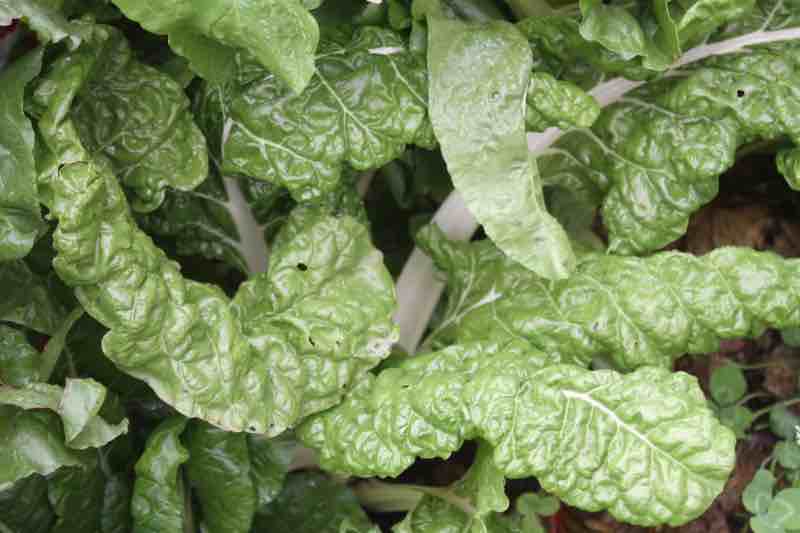
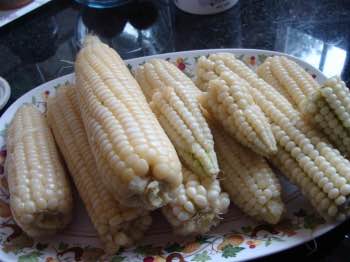
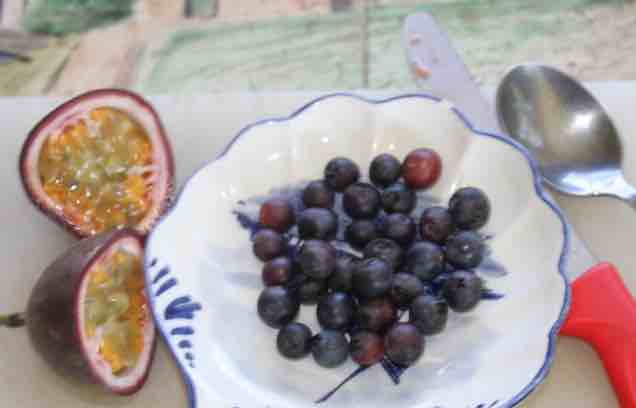
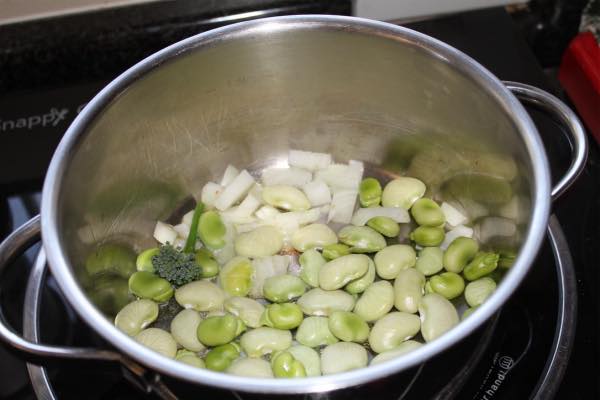
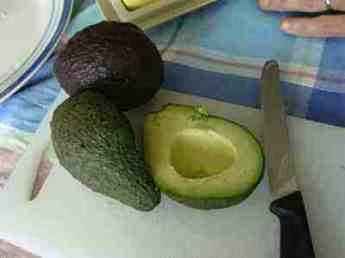
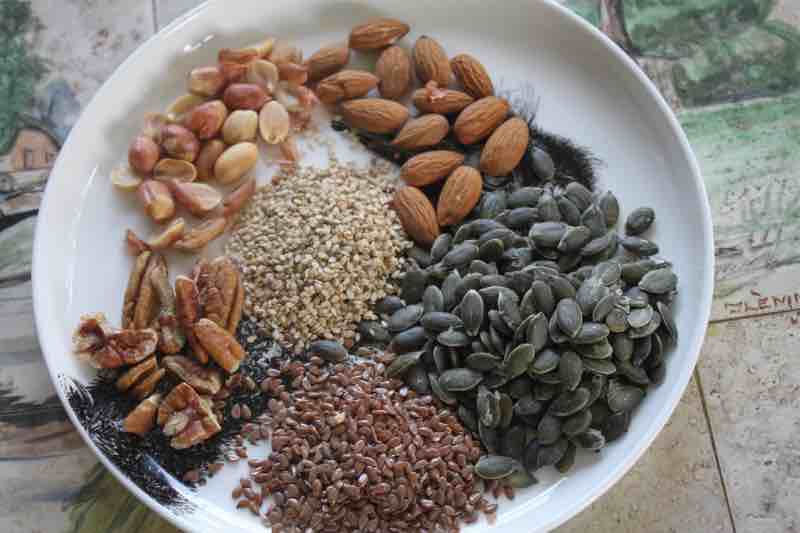
What does dietary fiber do?
Fiber found naturally in food plays an important role in preventing constipation, lowering blood cholesterol and providing nutrients for the friendly bugs in the gut.
It also has a role in providing satiety via the so-called incretin hormones; that sense of fullness which helps control blood glucose. With diabetes being rampant in the world getting sufficient dietary fiber is one of the keys to greater wellness.
"Patients with COVID-19 have a high prevalence of diabetes."
- JAMA (Dec 6, 2022)
Getting sufficient fiber is not small beer; it may mean surviving a serious viral infection.
Why is dietary fiber important?
The friendly bugs in the gut that influence hugely important issues like generalised inflammation, the formation of the tau proteins that cause Alzheimer's Disease and nutrients for the bowel lining must have plenty of dietary fiber. In the happy tum the so-called microbiome consists of an astonishing 2kg of natural bacteria, viruses and yeast cells.
Consuming probiotics either in our food or from supplements has little benefit unless we also provide the fiber these friendly bugs need to feed on.
Constipation has a central role to play in many serious bowel diseases. Understanding what is a dietary fiber is not necessary for those eating whole, natural foods. But if you are enjoying typical grocery store meals then this page is especially for you; assuming you have no desire to be constantly frequenting doctors' rooms and taking many diverse drugs on a regular basis.
"It has been estimated that 20% of Medicare beneficiaries have five or more chronic conditions; and fifty percent are taking 5 plus drugs."
What foods have dietary fiber?
Small changes for those who understand what is a dietary fiber can be profoundly important. Could you add a handful of nuts and a fruit such as an apple daily to your food plan? That would help keep the doctor away; literally.
There is strong research that adding a whole grain such as grits daily is profoundly important for the prevention of heart disease[1]; remove also say a cookie made from refined flour and it is even better. It's all about the fiber.
Two types of dietary fiber
There are 2 types of dietary fiber, for example the pectin in fruit and the bran from whole grains. They are not digested in the normal way like other carbs by enzymes in the small intestine, passing through instead to the colon where they provide nutrients for the so-called microbiome; the friendly bugs in the bowels.
Soluble dietary fiber
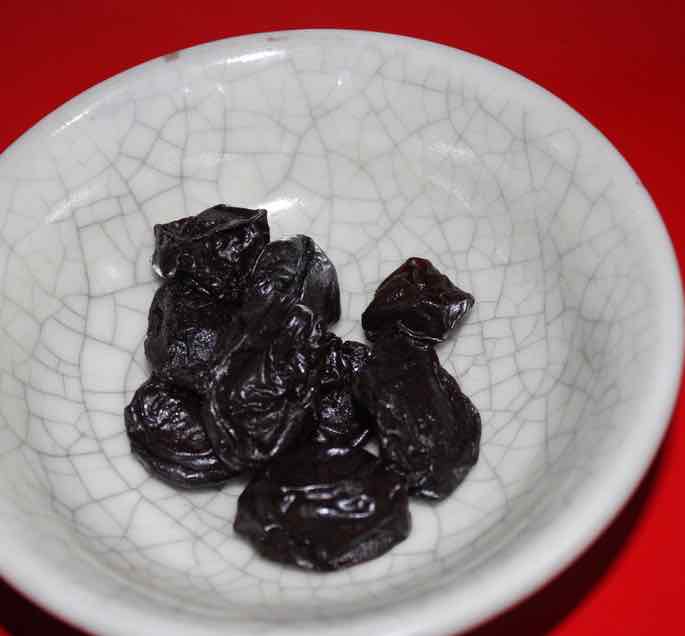 Stewed prunes for constipation
Stewed prunes for constipationSoluble dietary fiber like pectin forms a thick viscous liquid in the gut; and the beta-glucans in oats too. They have a profound influence on reducing the absorption of cholesterol.
The soluble pectin from just five prunes enjoyed daily is more effective than the most common medical treatment for preventing constipation; psyllium husks.
Prunes are a good deal cheaper and tastier too; and provide many other additional nutrients.
"Let thy food be thy medicine, and medicine be thy food."
Hippocrates (460 - 370 BC)
Insoluble dietary fiber
The insoluble dietary fiber from whole grains is becoming increasingly difficult to find. Corn on the cob would fit the bill perfectly in the summer months; steel-cut oats too. But we have grown accustomed to sandwiches and cereals that slide sweetly down the throat with little chewing needed.
Our understanding of what is a dietary fiber has been grossly undermined by a big fat lie; millers are allowed by international law to remove up to 40% of the goodies from wheat for example and still call it wholemeal.
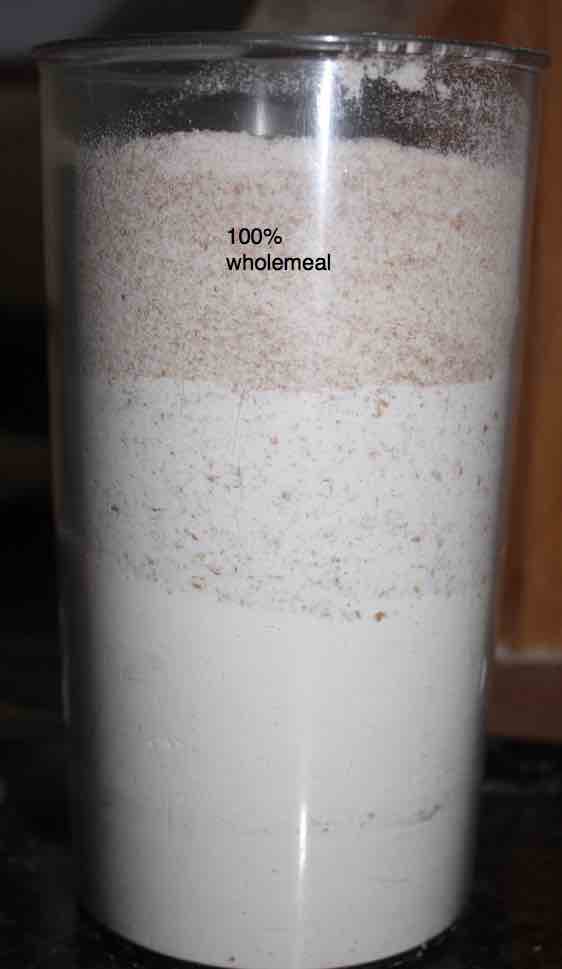
The label of the flour in the middle describes the product as wholemeal but even the dumbest person can see that most of the bran and much of the germ have been extracted.
The cake flour at the bottom of the container is completely devoid of the good stuff.
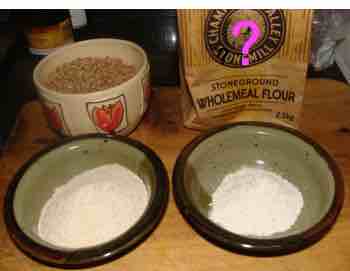 Chalk and cheese
Chalk and cheese"Food is any substance consumed to provide both nutritional support and energy to an organism."
Should cake flour be called a food? It does provide energy but otherwise zero nutritional support; and in any case most of us already consume more than enough calories.
Cakes, cookies and white bread do not pass muster; they aren't food. They have only calories.
Look for the 100% wholegrain sign. You won't find it very often; the best solution is to purchase your own mill and bake bread at home. It takes only five minutes to prepare the dough.
One slice of this 100% whole grain bread contains about 5 grams of fiber; that made from refined flour has almost none.
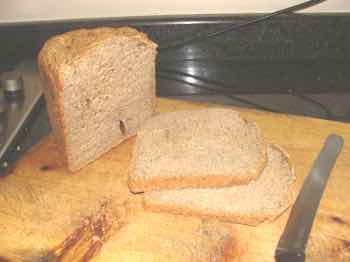
It's surprisingly light especially when using the sourdough method.
Recommended intake of dietary fiber
The recommended intake of dietary fiber is at least 30 grams per day; more for men. We advise increasing the amount gradually over a matter of weeks so that the bowel can become accustomed to the new status quo.
A wholesome salad and a slice of the bread above would provide nearly a half of your daily fiber needs.
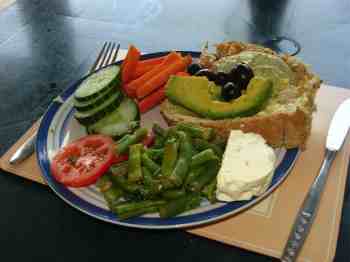 Salads, avocado and hummus on 100% wholemeal bread; half of your daily need for fiber.
Salads, avocado and hummus on 100% wholemeal bread; half of your daily need for fiber.Added isolated or synthetic fiber
Food companies are adept at refining out most of the goodies from their products and then using added synthetic fiber to fool us. Look out for terms like oligofructose and xanthan-gum in the list of ingredients; they have no proven value.
Many of them have little influence on lowering blood glucose and cholesterol levels. Nor do they make bowel movements easier; or improve the absorption of minerals as natural fiber does.
The other deception to be aware of is that having extracted the natural fiber and other nutrients from good foods they become utterly tasteless; so large amounts of sugar and salt are often added. It's important to become a discerning label-reader if you are enjoying typical products on the industrial diet.
Many food companies are in the business of extracting the best parts, selling them instead at great profit to farmers for animal feed; and then adding back various synthetic nutrients and calling their products enriched. Don't be deceived by the sales pitch.
These synthetic fibers are added to thicken foods; and stabilize peanut butter and ice-cream for example.
What is a dietary fiber?
What is a dietary fiber is central to the wellness of the bowels; and the levels of glucose and cholesterol in the blood.
Be aware that much of the fiber added to processed foods probably does not have the same benefits for your wellbeing as that in unrefined meals.
Lignans are bioactive plant compounds located in the natural fiber; they play a profoundly important role in wellness. You won't find them in oligofructose, for example.
Where to start?

Where to start is a matter of personal preference; perhaps a bowl of stone ground grits or steel-cut oats with berries.
Natural honey in your grits, if you can find it has a low glycemic index and won't raise your blood glucose[1].
A green salad for lunch with hummus for protein takes a lot of beating.
- How to get more fiber is a subject that should be uppermost in the minds of all those who desire greater wellness.
Spinach, green beans and other coloured vegetables such as butternut would complete your day. Unsalted peanuts and sunflower seeds would be the cherries on top.
Now that you know what is a dietary fiber you are well on your way to a happy tum; less pain, pills and fewer consultations with your doctor.
It's purely anecdotal but by understanding what is a dietary fiber and other issues like daily exercise of course, neither the good wife nor I, in our mid-seventies take any medication; we have not needed to consult doctors in over a year.
We do work hard at it though; almost no refined commercial foods. Whilst it may seem initially impossible to completely forego donuts, cake and delicious scones it is such a relief having little pain and plenty of energy to complete our daily tasks.
We both continue to work part-time. Life is good; it's never too late to start.
In any case these baked goods and frozen dairy desserts usually are sweetened with the dreaded Splenda that causes DNA damage; and loss of the lining of the intestine leading to leaky gut syndrome.
Are we food snobs or epicures? You be the judge; we absolutely love the taste of our wholesome nosh and don't mind the extra chewing needed for fiber-rich meals.
Colorectal cancer
New research published in 2023 shows that obesity is associated with more than double the risk of malignant colorectal tumours[3]. What is a dietary fiber is singularly important for those determined to evade these dread diseases.
"We found was that if patients had sufficient dietary fiber intake, over 20 g/d, they were actually about five times more likely to respond to cancer treatment with immunotherapy; and had more prolonged survival."
- Jennifer Wargo, MD (Anderson Cancer Center)
Parkinson's Disease
"Experts have known for a very long time that constipation is a potential risk factor for Parkinson's Disease.
- Mayo Clinic
Life is a journey and it is good to take note of the milestones as we pass them by; there are lessons to be learned, it's called wisdom, and some of them may be of interest to others.
I have only recently discovered this little gem from the Mayo Clinic; and realised that there is a connection between the incipient, serious constipation I have suffered from since childhood and the worrying tremor that began in my right hand in my early forties. The neurologist warned me that it could progress to full-blown Parkinson's Disease.
That is how important learning what is a dietary fiber has been in my own personal life; getting on top of constipation has probably saved me from many nasty conditions and perhaps this debilitating neurodegenerative disease.
"Researchers found signs that a high-fat, low fiber diet may increase inflammation in the gut that prevents it from naturally suppressing tumors. The cells of young people with colorectal cancer appeared to have aged more quickly, by 15 years on average, than a person's actual lifespan."
- American Society of Clinical Oncology conference 2024
American college of gastroenterology guidelines
The number-one recommendation of the ACG is to increase dietary fiber to 20 to 30 grams per day. Personally that's not enough for me; I need 40 g/d and especially that from greens. A footstool too might help.
TONE describes the best practices.
- T: Three minutes on the loo
- O: Once daily defecation
- N: No excessive straining
- E: Enough fiber
The guidelines discourage lengthy periods of sitting on the toilet, cellphone use and reading.
They also recommend a warm bath which eases rectal problems like haemorrhoids by increasing blood flow through the tissues.
Rubber band ligation has a success rate of about 70% in treating even third-degree symptomatic haemorrhoids.
A 10% increase in proportion of UPFs was associated with 6% higher CRC risk.
Substitution of 10% of the overall proportion of the diet comprising UPFs or PFs with 10% unprocessed foods was associated with a decreased risk of CRC.
- International Journal of Cancer (February 2025)
- High intake of refined grains linked to increased risk of heart disease and death
- Glycaemic and insulinaemic properties of some natural German honeys.
- Association of Overweight, Obesity, and Recent Weight Loss With Colorectal Cancer Risk
- Sucralose Damages DNA, Linked to Leaky Gut
- Associations between degree of food processing and CRC risk
When browsing use right click and "Open Link in New Tab" or you may get a bad gateway signal.
Newsletter
Our newsletter is entitled "create a cyan zone" at your home, preserving both yourself and Mother Earth for future generations; and the family too, of course. We promise not to spam you with daily emails promoting various products. You may get an occasional nudge to buy one of my books.
Here are the back issues.
- Lifestyle and ideal body weight
- What are ultra-processed foods?
- Investing in long-term health
- Diseases from plastic exposure
- Intensive lifestyle management for obesity has limited value
- A world largely devoid of Parkinson's Disease
- The impact of friendly bacteria in the tum on the prevention of cancer
- There's a hole in the bucket
- Everyone is talking about weight loss drugs
- Pull the sweet tooth
- If you suffer from heartburn plant a susu
- Refined maize meal and stunting
- Should agriculture and industry get priority for water and electricity?
- Nature is calling
- Mill your own flour
- Bake your own sourdough bread
- Microplastics from our water
- Alternative types of water storage
- Wear your clothes out
- Comfort foods
- Create a bee-friendly environment
- Go to bed slightly hungry
- Keep bees
- Blue zone folk are religious
- Reduce plastic waste
- Family is important
- What can go in compost?
- Grow broad beans for longevity
- Harvest and store sunshine
- Blue zone exercise
- Harvest and store your rainwater
- Create a cyan zone at your home
Did you find this page interesting? How about forwarding it to a friendly book or food junkie? Better still, a social media tick would help.
- Bernard Preston homepage
- Fiber
Address:
56 Groenekloof Rd,
Hilton, KZN
South Africa
Website:
https://www.bernard-preston.com